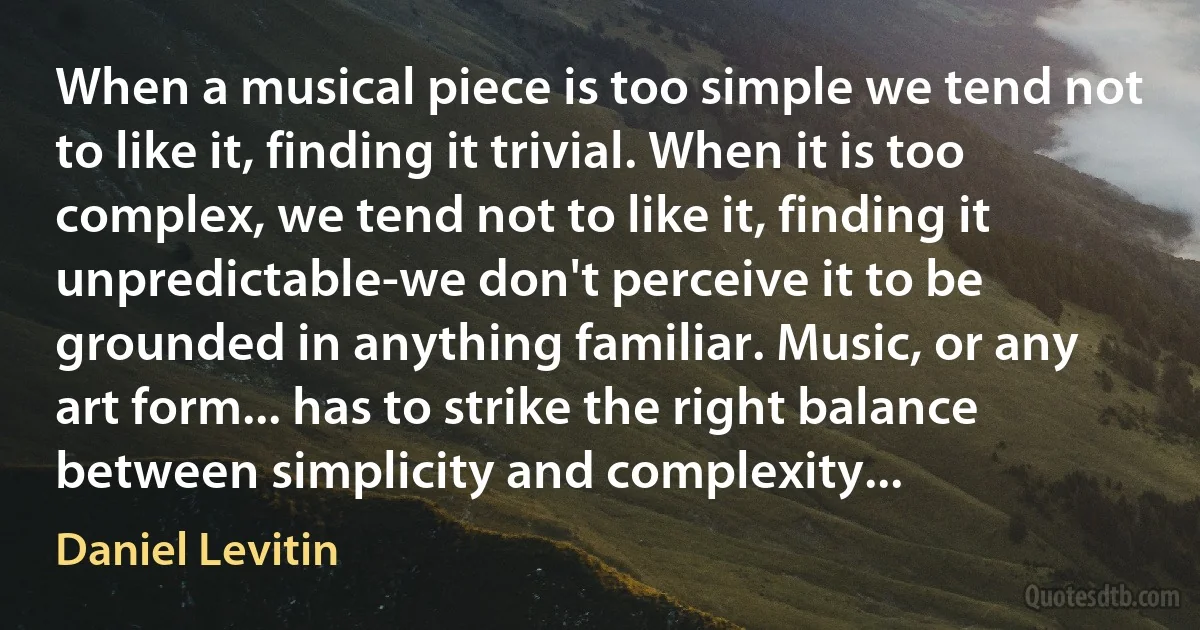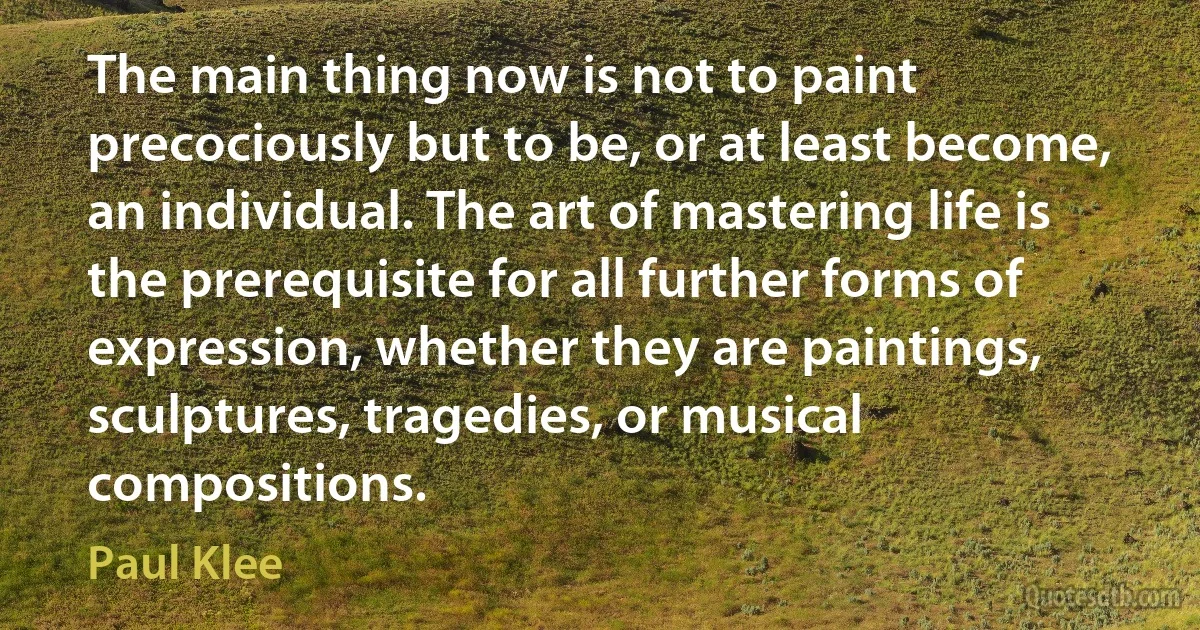Musical Quotes - page 45
A composer's awareness of the plurality of functions of his own tools forms the basis for his responsibility just as, in everyday life, every man's responsibility begins with the recognition of the multiplicity of human races, conditions, needs, and ideals. I would go as far as to say (as my anger comes back) that any attempt to codify musical reality into a kind of imitation grammar (I refer mainly to the efforts associated with the Twelve-Tone System) is a brand of fetishism which shares with Fascism and racism the tendency to reduce live processes to immobile, labeled objects, the tendency to deal with formalities rather than substance. Claude Lévi-Strauss describes (though to illustrate a different point) a captain at sea, his ship reduced to a frail raft without sails, who, by enforcing a meticulous protocol on his crew, is able to distract them from nostalgia for a safe harbor and from the desire for a destination.

Luciano Berio
I did a movie with Peter Frampton. He's a musical genius, but I don't listen to his stuff. So I had to continuously try to draw attention away from the fact. "Hey Peter Frampton! Do you like toast too!? Yes, as do I, it is warm and crispy... and the perfect place for jelly to lay. Now stay the fuck away from me Frampton, I ain't got shit to say to you!"

Mitch Hedberg
I am always interested in the ways of scoring the sound of the poem, especially a poem with long lines. Spaces within a line, double colons, slashes, are indications of pause, of breath, of urgency, they are not metrically exact as in a musical notation but they serve (I hope) to make the reader think about the sound of the poem-just as traffic symbols, when driving, make us almost unconsciously aware of a steep hill, an intersection, an icy bridge etc. Poets have used such indicators long before modernism-Dickinson's dashes and capitals are one example. Contemporary composers have also expanded on classical notation with new, self-invented markings. You want to find a way that is not random or chaotic but allows for various renderings of a line, a punctuation of the imagination.

Adrienne Rich
I was one of the Asian American theatre people who protested the casting of Jonathan Pryce as the Eurasian pimp in the musical MISS SAIGON when it came to Broadway, as an example of "Yellow Face” casting.. The intensity, vehemence, and anger I felt, on both sides of that issue, left me shaken for many years afterwards. So I wrote FACE VALUE, a comedy of mistaken racial identity, to explore the question, "What does it really mean to ‘play' another race?” As noted above, FACE VALUE became an infamous flop, but the idea of doing a comedy of mistaken racial identity stayed with me for the next fifteen years or so. Eventually, I found another way to realize this notion with YELLOW FACE.

David Henry Hwang
Perhaps history this century, thought Eigenvalue, is rippled with gathers in its fabric such that if we are situated, as Stencil seemed to be, at the bottom of a fold, it's impossible to determine warp, woof, or pattern anywhere else. By virtue, however, of existing in one gather it is assumed there are others, compartmented off into sinuous cycles each of which had come to assume greater importance than the weave itself and destroy any continuity. Thus it is that we are charmed by the funny-looking automobiles of the '30's, the curious fashions of the '20's, the particular moral habits of our grandparents. We produce and attend musical comedies about them and are conned into a false memory, a phony nostalgia about what they were. We are accordingly lost to any sense of continuous tradition. Perhaps if we lived on a crest, things would be different. We could at least see.

Thomas Pynchon
In terms of my singing I have sometimes been asked how it all began, and it's usually been a little hard for me to set the story down in any continuous narrative. From the days of my childhood I've been listening to sounds and singers, both colored and white, and absorbing a little bit here and a little bit there. Countless musicians of talent have helped. But it is Billie Holiday, whom I first heard in 52nd Street clubs in the early 1930s, who was and still remains the single greatest musical influence on me. It has been a warm and wonderful influence and I am very proud to acknowledge it. Lady Day is unquestionably the most important influence on American popular singing in the last 20 years. With a few exceptions, every major pop singer in the U.S., during her generation has been touched in some way by her genius.

Frank Sinatra
Jon Stewart: But I can show you a prediction that's wrong today. It comes via Dick Morris, King of Wrong Mountain. And it concerns accountability for pundits.
Dick Morris (clip): Romney's going to win. He's going to win by, I believe, more than 5 points. I believe he's going to get more than 300 electoral votes.
Dick Morris (clip): You know, after the election, either I'm going to have to go through a big reckoning, or they are.
Jon Stewart: No, you won't and they won't. Nobody will, because you're pundits. You live in a reckoning-free zone. One thing we learned is that punditry is like musical chairs. The only difference is, in musical chairs, when the music stops, nobody ever moves the chair. They just keep adding more chairs.

Dick Morris
Music would take over at the point at which words become powerless, with the one and only object of expressing that which nothing but music could express. For this, I need a text by a poet who, resorting to discreet suggestion rather than full statement, will enable me to graft my dream upon his dream - who will give me plain human beings in a setting belonging to no particular period or country. ... Then I do not wish my music to drown the words, nor to delay the course of the action. I want no purely musical developments which are not called for inevitably by the text. In opera there is always too much singing. Music should be as swift and mobile as the words themselves.

Claude Debussy
I believe that gazing out at his fields, as he so often did, he found a kind of peace in the balance of the sculptures, which were like so many aspects of his identity. Physically manifested and set together to form their own dialogue -- ultimately aesthetic -- the sculptures in the fields brought a kind of musical order to the dissonance of his inner flow of feelings. He always said that for him, art was easier to do than life.

David Smith
"Most musical, most melancholy" bird!
A melancholy bird! Oh! idle thought!
In nature there is nothing melancholy.
But some night-wandering man, whose heart was pierced
With the remembrance of a grievous wrong,
Or slow distemper, or neglected love,
(And so, poor wretch! filled all things with himself,
And made all gentle sounds tell back the tale
Of his own sorrow) he, and such as he,
First named these notes a melancholy strain.

Samuel Taylor Coleridge


